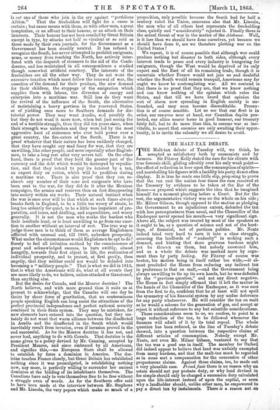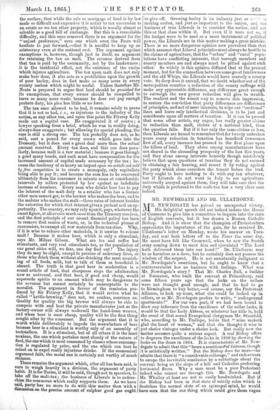THE MALT-TAX DEBATE.
THE Malt-tax debate of Tuesday will, we think, be- accepted as satisfactory both by economists and by farmers. Sir Fitzroy Kellystated the case for his clients with true forensic skill, gliding adroitly over his only weak point— the effect of reduction in beer upon the consumption of spirits— and marshalling his figures with a lucidity his party do not often display. It is true he made one little slip, proposing to prove that the tax cost the nation four times the sum received at the Treasury by evidence to be taken at the Bar of the House—a proposal which suggests the idea that he imagined himself for a moment pleading before a Court. But for the rest, the argumentative victory was on the whole on his side; Mr. Milner Gibson, though opposed to the motion as pledging the Government to an injudicious extent, defended the tax.- with less peremptoriness than usual, and the Chancellor of the - Exchequer never opened his mouth—a very significant sign. Above all, the subject was treated by most of the speakers as• it ought to be, as a question of science and not of the hust- ings, of financial, not of partizan politics. Mr. Neate- indeed tried very hard to turn it into a class struggle,. accusing the landlords of " audacity" in making such a demand, and hinting that More grievous burdens might yet be thrown on them, but nobody answered him, and as a whole the debate was marked more by argu- ment than by party feeling. Sir Fitzroy of course was- beaten, his motion being in itself rather too wide,—it al- most precluded the House from reducing any indirect tax in preference to that on malt,—and the Government being. always unwilling to tie up its own hands, but he was defeated by the " previous question," and not any direct negative.. The House in fact simply affirmed that it left the matter in. the hands of th8 Chancellor of the Exchequer, as it was sure from the first to do, confident that he at least will not spoil the symmetry of his financial system by any undue deference- for any party whatsoever. He will consider the tax on malt as he would a scheme for the generation of gas, and accept or reject it without reference to any but scientific considerations. Those considerations seem to us, we confess, to point to a large reduction of the tax, to be followed whenever the finances will admit of it by its total repeal. The whole question has been reduced, as the line of Tuesday's debate showed, into a question between the respective claims of different articles of consumption. Nobody except Mr. Neate, not even Mr. Milner Gibson, ventured to say that the tax was a good one in itself. The member for Oxford did indeed appear to believe that land was unfairly exempted from many burdens, and that the malt-tax must be regarded as in some sort a compensation for the concession of other- preposterous claims. Against those claims, too, he made out- s very plausible case. Primcl facie there is no reason why an estate should not pay probate duty, or why land devised in fee simple should only be charged a succession duty calculated upon the life-interest instead of upon the capital, or even why a landholder should, unlike other men, be empowered to pay a direct tax by instalments. There is a reason not on the surface, that while the sale or mortgage of land is by law made so difficult and expensive it is unfair to tax succession to an estate as we tax other property, which is usually almost as saleable as a good bill of exchange. But this is a remediable difficulty, and this once removed there is no argument for the "unjust preference," save one which even the Peers will hesitate to put formard,—that it is needful to keep up an aristocracy even at the national coat. The argument against exemptions is, however, though just in itself, no argument for retaining the tax on malt. The revenue derived from that tax is paid by the community, not by the landowners ; it is the incidental effect, not the existence of the excise which injures agriculture. The tax upon malt does not only make beer dear, it also acts as a prohibition upon the growth of poor barley, does in fact make so many acres in every county useless which might be useful. Unless therefore Mr. Neste is prepared to argue that land should be punished for its exemptions, that every owner should be compelled to leave so many acres waste because he does not pay enough probate duty, his plea has little or no force.
The tax once allowed to be bad, it remains solely to prove that it is not so bad, i. e., so injurious to the industry of the nation, as any other tax, and upon this point Sir Fitzroy Kelly made out a capital case. He exaggerated it of course; a lawyer speaking from a brief, which he was in reality doing, always does exaggerate ; but allowing for special pleading, the case is still a strong one. The tax probably does not, as he said, cost a pound for every crown which goes into the Treasury, but it does cost a great deal more than the actual amount received. Every tax does, and this one does pecu- liarly, because malt is a raw material ; because it goes through a good many hands, and each must have compensation for the increased amount of capital made necessary by the tax ; be- cause the tendency of so heavy an impost upon an article not sold by free competition is to create a monopoly, only capitalists being able to pay it; and because the sum has to be recovered ultimately from the consumer in minute sums at considerable intervals by sellers protected by law against an indefinite increase of numbers. Every man who drinks beer has to pay the interest of the malt duty to a retailer who has a licence other men cannot get, to the brewer who makes the beer, and to the malster who makes the malt—three rates of interest besides the extortion for which that interest gives a pretext and an op- portunity. The country, we may rely uponit, pays, whatever the exact figure, at all events much more than the Treasury receives, and the first principle of our recent financial policy has been to remove that source of waste, or, in the technical phrase of economists, to exempt all raw materials from taxation. Why, if it is wise to release other materials, is it unwise to release malt ? Because it makes beer, which is only a stimulant, says Mr. Milner Gibson. What are tea and coffee but stimulants, and very real stimulants too, as the population of our great cities will, we fear, one day find out ? The injury they do may be slight, except to persons of sedentary lives, or those who drink them without also drinking the most nourish- ing of all foods, milk, but to talk of them as beneficial is absurd. The truth is that good beer in moderation is a sound article of food, that cheapness stops the adulteration now so universal, and that beer, if good and cheap, would supersede spirits to an amount which may be dangerous to the revenue but cannot certainly be unacceptable to the moralist. The argument in favour of the remission pro- duced by Sir Fitzroy Kelly, that it would revive what he called " kettle-brewing," does not, we confess, convince us. Quality for quality the big brewer will always be able to compete with and beat the private manufacturer just as the factory-owner will always undersell the hand-loom weaver, and when beer is once cheap, quality will be the first thing sought after by the consumer. But the argument that it is worth while deliberately to impede the manufacture of beer because beer is a stimulant is worthy only of an assembly of•teetotallers. It is a stimulant, but of all others it is the least noxious, the one which partakes most closely of the nature of food, the one which is most consumed by classes whose consump- tion is regulated by price, and the one which can best be relied on to expel really injurious drinks. If the economical argument fails, the moral one is certainly not worthy of much reliance.
There remains the argument which, after all has been said, is sure to weigh heavily in a division, the argument of party habit. It is for Tories, it will be said, though not in speeches, to take off the malt-tax; the business of Liberals is to enfran- chise the commerce which really supports them. As we have said, party has no more to do with this matter than with a discussion on the precise amount of sulphur good gas ought to give off. Growing barley is an industry just as ra.-,', making cotton, and just as important to the nation, and the business of true Liberals is to consider the nation, and not this or that class within it. But even if it were not so, if the budget were to be used as a mere instrument of political power, the Liberals are in this matter making a great mistake. There is no more dangerous opinion now prevalent than that which assumes that Liberal principles must always be hostile to the claims of agriculture, that the "urban" and "rural" popu- lations have conflicting interests, that borough members and county members are and always must be pitted against each other. So widely is this opinion diffused that at the present moment, but for the connection between some great landowners and the old Whigs, the Liberals would have scarcely a county vote. So deep does it extend, that we doubt whether out of the metropolitan counties a reduction of the county suffrage will make any appreciable difference, any difference great enough to outweigh the new power reduction will give to wealth. The readiest and the wisest way to remove this impression, to restore the conviction that party differences are differences of principles, and not of mere interests, to wipe out "sectional" lines and leave only intellectual divisions, is to be just and considerate upon all matters of taxation. If it can be proved that some other article, say sugar, has really greater claims to reduction than malt, claims of a national kind, then the question falls. But if it has only the same claims or less, then Liberals are bound to remember that for twenty unbroken years every reduction in taxation has benefited townsmen first of all, every increase has pressed in the first place upon the tillers of land. They alone among manufacturers have not shared in the abounding prosperity of the last five years, and they alone among interests honestly though mistakenly believe that upon questions of taxation they do not succeed in obtaining a fair hearing, and resent it by voting against the party which alone considers the tenant before the lord. Party ought to have nothing to do with any tax whatever, but if Liberals do not want in July to see agriculture universally arrayed against them, they will take care that the duty which is preferred to the malt-tax has a very clear case indeed.































 Previous page
Previous page